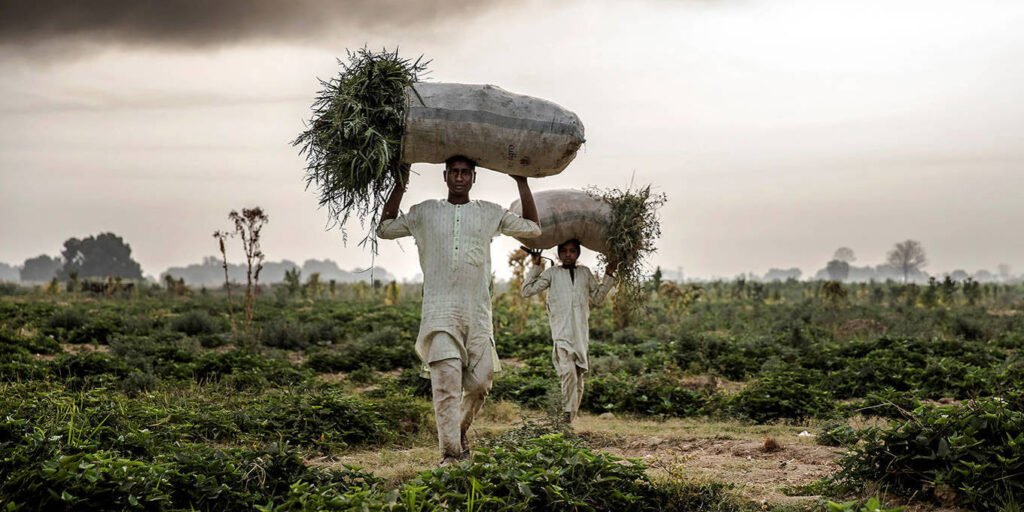While the number of people facing hunger globally declined last year, Africa experienced an uptick in undernourishment. But the continent’s policymakers can reverse this trend by improving agricultural productivity, which requires restoring soil fertility, embracing innovation, and investing in human capital.
URBANA, ILLINOIS – According to The State of Food Security and Nutrition in the World 2025, a report recently released by the five leading United Nations agencies working on the issue, the number of people facing hunger globally declined from 688 million in 2023 to 673 million in 2024. But progress has not been equal, with Africa experiencing a slight increase in the number of undernourished people, from 296 million to 306 million. Worryingly, this pattern is set to continue: the report estimates that, even as global hunger declines, 512 million people will still be undernourished in 2030, nearly 60% of whom will be in Africa.
But the continent’s policymakers can avert this outcome. The most effective strategy would be to improve Africa’s agricultural productivity and maintain progress against extreme weather events such as droughts and flooding. That will require governments to work with the African Union and key stakeholders in the agriculture sector, including universities, research institutions, development partners, NGOs, financial institutions, and philanthropic organizations.
They should focus on five areas. First, there is an urgent need to mobilize investment in improving soil health and restoring Africa’s degraded landscapes, which are a major cause of food insecurity and hunger. As much as 65% of Africa’s cultivated land is degraded, and the continent loses a staggering $4 billion worth of soil nutrients each year to erosion. Continuous cultivation is particularly damaging to soil fertility and results in lower crop yields across the continent.
African leaders are waking up to this crisis. In 2024, the AU convened a summit on fertilizer and soil health, bringing together a broad coalition of stakeholders to discuss strategies for improving Africa’s crop productivity. Perhaps the most important outcome of the summit was an action plan for addressing soil health in all agricultural sectors, with an emphasis on fostering multi-stakeholder partnerships.
Second, Africa must increase investment in agricultural research and development to unlock sustainable productivity gains. Currently, most African countries allocate less than 1% of their agriculture sectors’ share of GDP to agricultural R&D. By increasing this share, and mobilizing private-sector capital, African governments could help drive innovations, from climate-resilient and high-yielding crop varieties to early warning systems for pests and diseases.
Third, African governments and all other stakeholders must ensure that farmers embrace existing and future technologies, such as climate-smart irrigation systems, real-time weather forecasting, and mobile-based platforms that deliver timely trainings, recommendations, and support. Several countries are starting to recognize that encouraging and enabling the uptake of the latest advances is essential for improving agricultural efficiency and resilience. For example, earlier this year, Botswana launched its own satellite in part to provide real-time agriculture data.

Introductory Offer: Save 30% on PS Digital
Access every new PS commentary, our entire On Point suite of subscriber-exclusive content – including Longer Reads, Insider Interviews, Big Picture/Big Question – and the full PS archive.
To accelerate the adoption of these innovations, governments must do more than improve access to them. They must also increase financial support for farmers, collaborate with universities to provide ongoing training, and invest in critical infrastructure such as roads, electricity, and digital connectivity. These efforts would empower farmers to become active participants in the transformation of African agriculture.
Fourth, special attention should be paid to women, who constitute an estimated 40% of Africa’s agricultural labor force but face systemic barriers that bar them from full and equal participation in the sector. Governments could develop capacity-building programs and enact policies that address some of the challenges confronting female farmers, including limited land ownership, which would go a long way toward spurring rural development and reducing household hunger.
Lastly, more must be done to engage with Africa’s fast-growing youth population, which is projected to double by 2050. Young Africans possess the energy, creativity, and entrepreneurial drive needed to strengthen food security, but remain underutilized largely because of limited access to financing and mentorship. To reduce hunger and create the conditions for long-term economic growth, African governments, the AU, and other stakeholders must invest in the next generation of agricultural leaders and innovators, providing them with the resources and training to succeed.
Reversing the alarming trend of increasing hunger across Africa calls for urgent action. Food security starts with healthy soil and sustainable productivity growth, which will require adopting regenerative farming practices, investing in agricultural research, and embracing new technologies. But these changes must be coupled with efforts to empower farmers – particularly women – and unlock Africa’s youth potential. The continent already has the seeds of a solution to its hunger problem. Now it just needs the right conditions to grow them.

